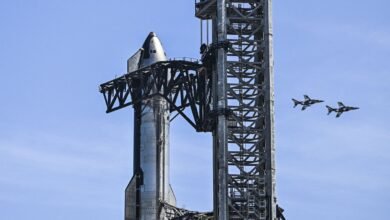Can Anyone Stop Elon Musk’s Quest to Dominate Space?

▼ Summary
– A rooftop bar in Cape Canaveral provides a casual public viewing of a routine SpaceX Falcon 9 rocket launch, highlighting the frequency of these events.
– SpaceX’s launch rate in a single year surpasses the combined total of the rest of the world, demonstrating its dominance in space access.
– Elon Musk’s Starlink satellite constellation is vastly larger and more capable than its competitors, giving him significant geopolitical influence, as evidenced by its critical role in modern warfare.
– The US government is heavily reliant on SpaceX for human spaceflight and is now planning a major weaponization of space program, which will likely further benefit the company.
– Despite Musk’s anti-establishment image, his success was built on strategic alliances and legal challenges within the Washington establishment to secure government contracts.
Perched on a hotel rooftop bar just off the Jimmy Buffett Memorial Highway, the scene is electric. It’s nearly midnight on a sweltering July evening in Cape Canaveral, and the bartender is pouring shots with Ozzy Osbourne blaring in the background. Suddenly, every head turns north. A brilliant orange plume lights up the sky as a SpaceX Falcon 9 rocket ascends from a launchpad twelve miles up the Banana River. The iconic “Iron Man” guitar riff kicks in, and moments later, the thud of the sonic boom prompts a chorus of cheers from the couple dozen spectators. For Elon Musk, however, this spectacle is routine. This launch marks the company’s 95th mission of the year, a pace that outstrips the combined launch total of every other nation on Earth.
On this particular evening, the Falcon 9 is deploying another batch of 28 Starlink internet satellites. Musk’s constellation now boasts over 8,000 satellites in orbit, a staggering figure that completely overshadows its nearest competitor, Eutelsat’s OneWeb, which operates around 630 satellites. The bandwidth disparity is even more pronounced, with each OneWeb satellite providing less than a tenth of the capacity of a Starlink unit. Not to be left behind, Amazon is aggressively pursuing its own Project Kuiper, led by a former SpaceX satellite chief. Their federal license mandates the deployment of 1,600 satellites by mid-next year, though the current count sits at just 102.
The geopolitical influence Musk wields through his space ventures is immense, a fact starkly illustrated by a global Starlink outage in late July. The disruption hampered drone communications for military forces on both sides of the Russia-Ukraine conflict. An officer stationed near Kupiansk reported that the failure was felt worldwide, underscoring how integral Musk’s infrastructure has become to modern warfare. Just two days after the launch witnessed from the rooftop, another Falcon 9 carried four astronauts to the International Space Station aboard a Dragon capsule. SpaceX’s Dragon is currently America’s only means of transporting humans to space, a point Musk reportedly emphasized to former ally Donald Trump during a dispute over government contracts.
Musk now stands to leverage his dominance in launch services and satellite communications into a third critical domain: the weaponization of space. For the first time in decades, the United States is openly developing space-based defensive capabilities, citing threats from Russia and China. The Pentagon is investing in spacecraft designed to approach and potentially disable adversarial satellites. A separate presidential initiative has pledged $175 billion for a program that could eventually involve hundreds of orbiting interceptors, supported by an even larger network of communications satellites.
While Musk’s companies are unlikely to manufacture the weapons themselves, the tasks of launching them into orbit and ensuring they can communicate are squarely within SpaceX’s expertise. Although his direct access to the Oval Office may have diminished, a significant military space buildup is almost certain to benefit his enterprises. The critical question remains: to what extent? When orbital defense systems are deployed, how many keys will Elon Musk hold?
The degree of control billionaires exert over global infrastructure can be unsettling. Observers have watched Musk navigate political and policy battles with forceful determination, even as his companies achieve engineering marvels once confined to science fiction. This track record makes the prospect of his involvement in militarizing space a matter of profound consequence. As Victoria Samson, chief of space security at the Secure World Foundation, noted, “The US government depends upon him very heavily. I had been asking US space officials: ‘You have yoked yourself to a very mercurial personality. Doesn’t that concern you?’”
The foundation of this dominance was built on revolutionizing rocket technology. In the early 2010s, space access was prohibitively expensive and slow, with the US attempting fewer than 20 launches annually at costs exceeding $10,000 per kilogram. Musk, alongside legendary engineer Tom Mueller, adopted a scrappy, cost-cutting approach. They famously replaced NASA’s $1,500 latches with $30 alternatives designed for bathroom stalls and used commercial air conditioning units for the Falcon 9’s payload bay instead of a custom $3 million cooling system.
Despite cultivating an anti-establishment persona, Musk proved adept at navigating Washington politics. He cultivated alliances with influential figures like former NASA administrator Michael Griffin, who championed cheaper access to space, particularly to low Earth orbit. When faced with opposition, Musk was not afraid to litigate, as seen when he sued the Air Force for awarding an $11 billion contract to the United Launch Alliance, a joint venture between Boeing and Lockheed Martin that held a monopoly at the time.
(Source: Wired)





